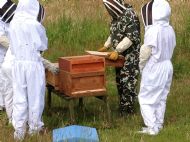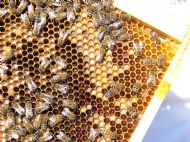 Bournmoor Conservation Group | sitemap | log in Bournmoor Conservation Group | sitemap | log in
|
 |
||
| This is a free Spanglefish 1 website. | ||
Bees for BiodiversityPLEASE SEE NEWS SECTION FOR UPDATES In 2006, Bournmoor Conservation group got their first Beehive (donated by Mr Alan Hiscock). Since then, our bees have gone from strength to strength, with hives being placed as far afield as York and the Scottish Borders.Not only do the bees provide wax and honey for the Conservation Group to sell to increase funds, they also perform a vital role in the local environment...Bees for Biodiversity is one of the ongoing projects run by the group to increase the sustainability and biodiversity of the local area. Bees are one of the best pollinators in the world- often referred to as 'flying fertiliser'! They pollinate almost a third of everything we eat- from fruit trees to runner beans, and without them our farming and horticulture systems simply would not exist.There has been a steady decrease in the number of wild bee populations surviving winters, so it is essential that more bee colonies (under the guidance of beekeepers) are established. Managed bee colonies, such as the ones the Conservation Group look after, stand a better chance of survival as they can be treated for diseases such as Deformed Wing Virus and sustained over the winter if necessary with judicious use of feeders.It is a national (indeed, a worldwide) concern, with many groups, businesses and councils as well as individuals taking responsibility for protecting bees and developing colonies within their areas- any internet search will immediately show you the importance many people place on this problem.In short, no bees = no plants. No plants = no animals. And we're animals.Bournmoor Conservation Group is always happy to provide help and advice- whether it's coming to look at our hives for a lesson in how to care for bees or giving you guidance in setting up your own hives. We also have a member who can make Top Bar and National hives, so we occasionally can also provide fully stocked hives when our bee population grows a bit too much! Please contact us to check prices and availability.If you are interested in taking part in this project, please read the further information at the bottom of this page.As one hive has an effect for up to 3 miles around it, we look closely at where we can place our hives for maximum impact. There are several types of colony we can create, each of which is suitable for different needs and areas. For example:
Each site is selected and the hives situated according to the best possible scenario for biodiversity/pollination improvement. If you have a site you'd like us to consider, or would like us to recommend the type of hive/colony best for your area, please contact Paul on 0191 385 5770.
|  |
|
 | ||
 smaller.jpg)

